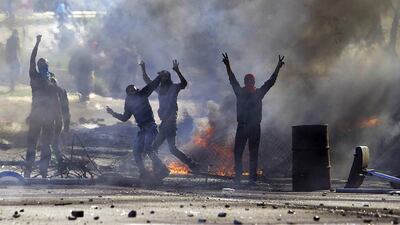KFAR KANA, ISRAEL // Clashes and demonstrations took place across Israel on Sunday as police raised alert levels amid a wave of anger over the deadly shooting of a young Arab-Israeli.
With shops, schools and business shuttered as Arab towns and villages observed a general strike, police raised the alert to one below the highest level and deployed in areas of friction.
The protests began early Saturday after police shot dead a 22-year-old in Kfar Kana near the northern city of Nazareth.
Kheir Hamdan was killed after police said he attacked officers with a knife as they tried to arrest a relative.
Police say warning shots were fired first before the officers felt their lives were threatened and aimed directly at him.
Relatives say Hamdan was killed “in cold blood”, with CCTV footage apparently contradicting the official version.
In the footage, a man in a white T-shirt is seen banging on a police van window with a knife for about 10 seconds before starting to run off as a man gets out of the back door.
The man fires his gun as he walks towards Hamdan, and officers drag his body into the vehicle.
The shooting brought angry crowds onto Kfar Kana’s streets where around 2,500 people demonstrated as youths threw stones and burnt tyres.
It came as Israel struggled to cope with a wave of unrest which has gripped annexed East Jerusalem for more than four months.
In Kfar Kana, up to 40 masked youths stoned police and set rubbish bins alight, police said.
Twenty people were arrested, among them minors.
Student groups were also staging protests in Jerusalem, the northern port city of Haifa and in Beersheva in the southern Negev desert.
In East Jerusalem, clashes raged in Shuafat refugee camp for a fifth straight day as masked youths held running battles with Israeli border police.
Shuafat has been the focal point of unrest since Wednesday when one of its Palestinian residents ran over two groups of pedestrians, killing a border police officer and a teenager and injuring eight other people.
Saturday’s shooting and the outpouring of Arab anger dominated Israel’s main newspapers.
"They killed him in cold blood because he was an Arab," Hamdan's father Rauf told Maariv, his words reflecting a widely held belief that police are quicker on the draw when an Arab is involved.
“If he had been a Jew, it wouldn’t have ended that way. They wouldn’t have shot him and if they had, they would have shot him in the leg and he wouldn’t be dead.”
Adalah, an NGO which supports Arabs in Israel, called the shooting “an execution,” dismissing the police’s version about warning shots.
But Israeli prime minister Benjamin Netanyahu vowed that anyone breaking the law would be “punished severely”.
He said he had instructed internal security minister Yitzhak Aharonovitch to examine the possibility of “revoking the citizenship” of anyone calling for Israel’s destruction.
But several Arab and left wing parliamentarians blamed the bloodshed on Mr Aharonovitch who said last week that any “terrorist” who harms civilians “should be killed”.
“This sweeping statement by the minister could be interpreted as taking off the gloves to allow the use of deadly force for reasons that are not justified and against the law,” Israeli rights group ACRI warned in a letter to the attorney general.
It said the CCTV footage raised “grave suspicions” that police had violated protocol stating that deadly force should be used only as a last resort.
Meanwhile, a ministerial committee approved a proposed bill on Sunday that would ensure the wholesale application of Israeli law to Jewish settlers in the occupied West Bank, a move sponsored by legislators who want Israel to annex part of the territory.
But justice minister Tzipi Livni, Israel’s chief negotiator in peace talks with the Palestinians that collapsed in April, said she would appeal the decision, effectively putting parliamentary ratification on indefinite hold.
Most countries consider the settlements Israel has built in the West Bank, which Palestinians seek for a state along with the Gaza Strip and East Jerusalem, as illegal.
* Agence France-Presse and Reuters

